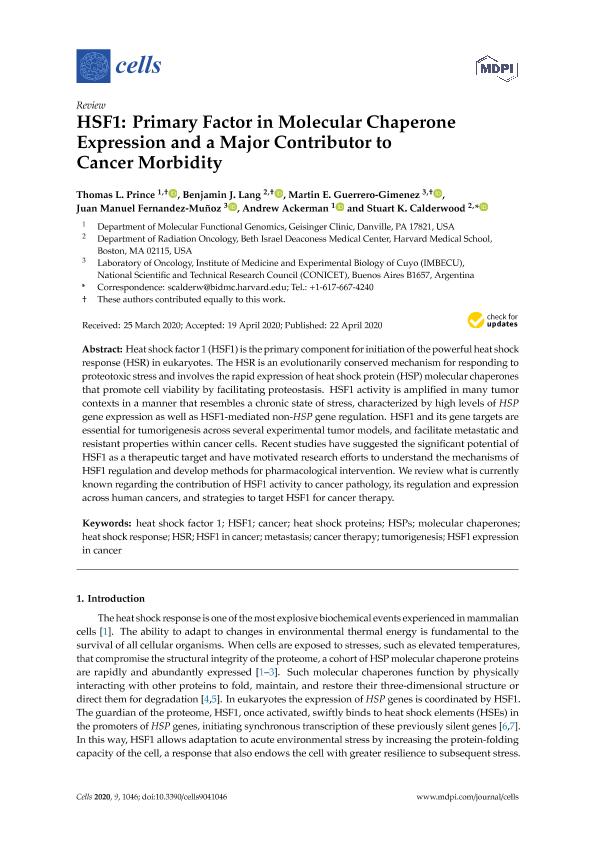Artículo
HSF1: Primary Factor in Molecular Chaperone Expression and a Major Contributor to Cancer Morbidity
Prince, Thomas L.; Lang, Benjamin J.; Guerrero Gimenez, Martin Eduardo ; Fernandez Muñoz, Juan Manuel
; Fernandez Muñoz, Juan Manuel ; Ackerman, Andrew; Calderwood, Stuart K.
; Ackerman, Andrew; Calderwood, Stuart K.
 ; Fernandez Muñoz, Juan Manuel
; Fernandez Muñoz, Juan Manuel ; Ackerman, Andrew; Calderwood, Stuart K.
; Ackerman, Andrew; Calderwood, Stuart K.
Fecha de publicación:
04/2020
Editorial:
MDPI
Revista:
Cells
e-ISSN:
2073-4409
Idioma:
Inglés
Tipo de recurso:
Artículo publicado
Clasificación temática:
Resumen
Heat shock factor 1 (HSF1) is the primary component for initiation of the powerful heat shock response (HSR) in eukaryotes. The HSR is an evolutionarily conserved mechanism for responding to proteotoxic stress and involves the rapid expression of heat shock protein (HSP) molecular chaperones that promote cell viability by facilitating proteostasis. HSF1 activity is amplified in many tumor contexts in a manner that resembles a chronic state of stress, characterized by high levels of HSP gene expression as well as HSF1-mediated non-HSP gene regulation. HSF1 and its gene targets are essential for tumorigenesis across several experimental tumor models, and facilitate metastatic and resistant properties within cancer cells. Recent studies have suggested the significant potential of HSF1 as a therapeutic target and have motivated research efforts to understand the mechanisms of HSF1 regulation and develop methods for pharmacological intervention. We review what is currently known regarding the contribution of HSF1 activity to cancer pathology, its regulation and expression across human cancers, and strategies to target HSF1 for cancer therapy.
Archivos asociados
Licencia
Identificadores
Colecciones
Articulos(IMBECU)
Articulos de INST. DE MEDICINA Y BIO. EXP. DE CUYO
Articulos de INST. DE MEDICINA Y BIO. EXP. DE CUYO
Citación
Prince, Thomas L.; Lang, Benjamin J.; Guerrero Gimenez, Martin Eduardo; Fernandez Muñoz, Juan Manuel; Ackerman, Andrew; et al.; HSF1: Primary Factor in Molecular Chaperone Expression and a Major Contributor to Cancer Morbidity; MDPI; Cells; 9; 4; 4-2020; 1-27
Compartir
Altmétricas
Items relacionados
Mostrando titulos relacionados por título, autor y tema.
-
Castro, Gerardo Daniel ; Delgado, Aurora Maria ; Costantini, Martin Hernan; Castro, Jose Alberto (Wiley-liss, Inc, 2001-02)
-
Castro, Gerardo Daniel ; Delgado, Aurora Maria ; Costantini, Martin Hernan; Castro, Jose Alberto (Elsevier Ireland, 2001-03)
-
Nicoud, Melisa Beatriz ; Formoso, Karina ; Medina, Vanina Araceli (Frontiers Media S.A., 2019-05)



